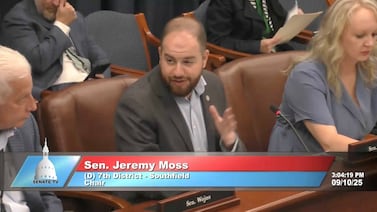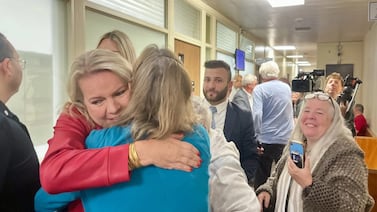A version of this post was originally distributed in Votebeat’s weekly newsletter. Sign up here.
The Department of Justice announced Friday it is suing the state of Georgia over the law the legislature passed this spring that would, among other things, restrict absentee voting and ban individuals from handing out water and food in polling place lines.
“Our complaint alleges that recent changes to Georgia’s election laws were enacted with the purpose of denying or abridging the right of Black Georgians to vote on account of their race or color, in violation of Section 2 of the Voting Rights Act,” Garland said at a news conference.
In addition to suing Georgia, the Department of Justice has issued guidance addressing threats against election workers and will establish a task force to investigate the growing problem. The DOJ will establish a toll-free hotline so people can report incidents they witness.
Georgia Sen. Raphael Warnock announced a new bill this week that would address the same issue of harassment—and also would narrowly limit moves by state officials and political partisans to remove election officials, would establish a mandatory buffer zone at polling locations between partisan observers and voters and poll workers, and would require that any challenger to the eligibility of another voter must have personal knowledge of potential ineligibility.
Warnock announced the measure on the same day the Senate voted, along party lines, not to advance the For the People Act, killing the Democrats’ bill at this stage. The timing has meant Warnock’s much narrower bill has received almost no attention even as it represents a clear departure from the goal of the For the People Act to be all things to all, well, people.
Clocking in at nearly 800 pages, the For the People Act dealt with everything from voting machines to government ethics, and also contained something for everyone to hate. Warnock’s bill doesn’t shave down and repackage the For the People Act, an alternative tack sought by Sen. Joe Manchin or urged by election law professor Rick Hasen. Warnock’s bill pursues entirely new goals—the For the People Act contained no language on threatening poll workers or intimidation by observers, despite advocacy from several election officials and groups. If not for the Democrats’ singular focus the past six months on such a gigantic bill, it’s likely that we would have seen more attempts in Congress to creatively author slimmer, more specific bills that directly address problems such as these. These kinds of bills stand a better chance of getting bipartisan support and can still tackle large problems now left unaddressed because of the failure of the For the People Act.
Back Then
After the Supreme Court outlawed all-white primaries in 1944, Southern politicians began to turn to racial gerrymandering and all-out intimidation of Black voters to achieve the same end. “The best way to stop n*****s from voting is to visit them the night before the election,” said former Mississippi governor and then-Sen. Theodore Bilbo, upset about an increase in Black voter registration from 3 percent in 1940 to 12 percent in 1947. Intimidation became the new way to prevent black voters from casting a ballot, but it would never be as effective as the structural limitations that the court had outlawed. Black registration would continue to rise every subsequent year.
In Other Voting News
- A judge in Georgia has thrown out most of a lawsuit, which had been filed by an advocate for access to ballot images he thought might prove fraud in Fulton County, home of Atlanta. The move brings a likely end to the attempt to audit, for a fourth time, the ballots cast in Fulton County in the 2020 general election.
- Lawmakers in Michigan passed a measure that would require both an ID and signature verification for a ballot to count, though it will almost certainly be vetoed by the state’s governor. Republicans have already said they’ll back a measure to override the veto through a petition drive of at least 340,000 signatures.
- The law has been championed by Republicans even as they concluded an investigation this week into claims of 2020 fraud in the state, finding none, and recommended that those who advanced the false claims for personal gain be investigated by the attorney general.
- In Pennsylvania, Republican state senators passed the House’s election overhaul bill, which requires voters to show ID — such as a voter registration card — anytime they cast a ballot and requires signature matching on absentee ballots. It also allows county administrators to start processing absentee ballots five days before Election Day and moves up deadlines for voters to register and request absentee ballots. Gov. Wolf plans to veto the bill (if he hasn’t already by the time you read this), which is why Senate Republicans are simultaneously trying to establish a voter ID requirement through a constitutional amendment.
- Pennsylvania lawmakers also have agreed to some restrictions on their ability to gerrymander congressional districts, but the bill was amended so that no such guardrails will apply to the drawing of state legislative districts. While this weakens the original aim of the bill, the guardrails are, experts told Votebeat and Spotlight PA, better than nothing.
- Sen. Rick Scott of Florida unilaterally blocked the appointment of a new director for the Cybersecurity and Infrastructure Security Agency in order to protest President Biden’s failure to increase security on the border, which Scott said was being demanded by residents of Florida, who do not share a border with Mexico, or any foreign country at all.
- A new draft of the House Appropriations Committee’s budget adds $400 million to an existing $100 million budget for election security. If the budget passes, the Election Assistance Commission will manage the grants, which will be passed through the states.
- The governor of Connecticut has signed a bill into law that would re-enfranchise those on parole in the state. In Wisconsin, which allows many individuals who are incarcerated to cast ballots, a report found that only 50 of the thousands of inmates eligible to register to vote cast ballots in 2020.
- Republicans in Ohio introduced the Ohio Election Security and Modernization Act, which would, among other things, require absentee voters to mail their ballots 10 days before Election Day, moving the deadline up a full week. The bill would also implement automatic voter registration at the Department of Motor Vehicles.
- The speaker for the Wisconsin Assembly has paid retired police officers $20,000 to look into baseless claims of voter fraud, and intends to hire another officer to help with the search. Critics say it is a waste of taxpayer money and will inflame already-heightened tensions between voters and elections officials.
In Your Downtime
On Tuesday, June 29, we’ll be hosting an online election quiz bowl. Securing Democracy cybersecurity expert Maurice Turner, Barnard College poli sci professor Michael Miller, and Reed College poli sci professor Paul Gronke (and also me, Jessica) have come up with a series of tricky questions on election history, administration, and security for Ballot Battle. The top three finishers will receive a pillow, courtesy of One Fresh Pillow, which should help to lull you to sleep amid your stress about the various election bills inching their way through state legislatures across the country. Brush up on your knowledge and sign up for the event here!
In His Downtime

This week’s hobbyist appropriately timed: It’s the aforementioned Paul Gronke! Our panelist is an avid gardener in his home state of Oregon. He started as a child, gardening with his dad, and has been doing it ever since. “I have endless fond memories of gardening because I grow so much in my garden that I use it as an excuse to meet my friends and neighbors,” he said.
On Paul’s Instagram you’ll find photos of broccoli, asparagus, flowers, a variety of lettuce, herbs, carrots—and the list goes on. He is, it would seem, his own grocery store.
“I love gardening in part because it provides immediate feedback, whether it be gratification when plants thrive or penalty when they fail. It requires careful preparation and planning. But ultimately, much is left in the hands of forces beyond my control, and I just try to adapt as best I can,” he said, which harkens back to the intense work that local election officials do every season. “They plan and prepare and are rewarded every ‘harvest’ season, which is of course another election. But every election is different and a lot of the time, you just plant the seed and hope the candidates and political parties and voters respond like you hope they do.
Many of Paul’s garden gifts go to election officials. “My favorite one of the elections community is going to be a long-time colleague, someone we might call ‘Mitt Misterson,’” said Paul. “Mitt is known as someone who just LOVES pineapple pizza. Anyway, this Mitt would post every year on Facebook that he desperately wanted a jar of my pickled peppers. It got a bit embarrassing (much like his ardent love of pineapple pizza).”
“Anyway, one year I sent Matt, I mean Mitt, a jar of these peppers without giving him much warning,” said Paul. “And it was so rewarding to bring a smile of surprise to his face and memories of the pickled peppers that he grew up with.”
Masterson — oops, “Misterson” — could not be reached for comment, but I can confirm he does deeply love pineapple pizza. We welcome Mitt’s response at Ballot Battle. Gauntlet thrown.




